MARKETING
40+ Blogs, Podcasts, and Video Series Content Marketers Love
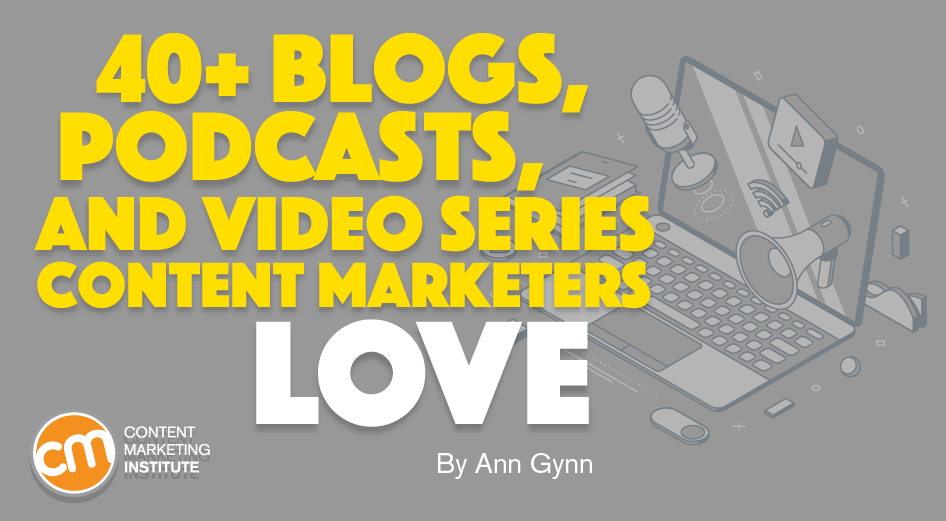
You don’t have to rely on Google searches to find helpful and relevant content marketing blogs and educational or inspirational resources.
Your peers already have vetted many options. We asked the Content Marketing Institute community for their go-to resources and rounded out the list with a query on Help a Reporter Out.
The top 40+ list of favorite #ContentMarketing blogs and educational or inspirational resources recommended by the @CMIContent and @helpareporter community via @AnnGynn. Click To Tweet
The 40+ blogs, podcasts, and video series about content, marketing, and content marketing earned their recommendations by helping marketers learn about new topics, dig into the nuances of familiar ones, tackle strategy and tactics, and get inspired to create.
Blogs, newsletters, and content sites
1. Animalz
While transitioning from my role as a content writer to a content marketer, the Animalz blog served as a Holy Grail of intelligent insights on how content compilation and distribution work at scale. I learned about how to curate thought leadership pieces even when I wasn’t one myself. The blog is a perfect mix of strategic and tactical content around content marketing and is a must-subscribe for content folk out there.
– Kajal Jain, growth manager, SAWO
2. Backlinko
If you’re new to SEO and want to learn all you can, Backlinko is the best resource I’ve found. They explain everything in clear detail with a consistent brand voice and real-world examples. You can certainly go beyond SEO to all areas of online marketing, as they have courses on virtually everything. Best of all is their newsletter, which is full of up-to-date content and reads quickly, so you know you’re keeping up with developments in the field.
– James Diel, founder and CEO, Textel
3. The Content Strategist
The Content Strategist shares short-form blog posts on content marketing and business tips. You’ll find interesting hooks, stories, and links to rare and insightful videos.
– Sally Ofuonyebi, freelance writer
4. Contentfolks
Fio Dossetto offers actionable advice in customer-focused marketing and product-led content. Her posts are filled with examples and related anecdotes that make it easier to understand and implement content marketing best practices.
– Meryl D’Sa-Wilson, content marketing manager, Global Call Forwarding, United World Telecom
5. CoSchedule
This site will assist you in discovering intelligent content marketing tactics. The blog pieces are authored by marketing agencies, inbound marketing gurus, and other seasoned marketing professionals.
– Geoff Cudd, owner, FindTheBestCarPrice.com
6. HubSpot
I’ve read the HubSpot blog for years. I like it because they have clear sections, and then it’s broken down into beginner, intermediate, and advanced. You know exactly what you’re getting and when. There’s a ton of information, and it isn’t to be missed.
– Ravi Davda, CEO, Rockstar Marketing
7. Marketing Dive
It provides insights on current events along with analysis for marketers, business owners, and entrepreneurs. Overall, it’s a good top-down resource of what’s happening in marketing in a given week. There also are a lot of opportunities to dive deeper into a subject or do more research. The content is also very organized, which I appreciate.
– George Tsagas, owner, eMathZone.com
8. Neil Patel
Neil Patel is the best SEO analyzer in the business. He has hundreds of blog entries to help any company rank higher in search results with small changes. Neil also offers tools to help you run checks on your website to see if you made changes correctly. He offers both video and written content that is easy to fit into any schedule.
– Jerry Han, chief marketing officer, PrizeRebel
9. Optimist
I came across their website and blog via the Tech Bound podcast. I think I’ve read close to every blog on their site, scouring for more information as it relates to growth content marketing and content strategy.
They also have a Slack channel called Top Of The Funnel, where there’s a lot going on. There are chats, conversations, webinars, AMAs. It’s a trove of content marketing resources. I also subscribe to their YouTube channel, where they house so many great guests and conversations around the world of growth content marketing.
– Emma-Jane Shaw, head of content, Uku Inbound
10. Reforge
Reforge is one of my favorite resources. The content they put together reflects the quality of their education programs, and you get great insight into the minds of experts – folks who have been in the trenches doing this work for a long time. Often, the experts haven’t built up a large social following nor are doing much education outside of their day jobs. And that’s because they don’t have to. They’ve built such credibility and are making enough money that they don’t need to invest in additional personal branding strategies. Reforge finds these folks and works with them to share their insights with their community, and it’s amazing.
– Tracey Wallace, director of content strategy, Klaviyo
11. Search Engine Journal
SEJ is a collection of insights on how to build a business your audience and search engines adore.
– Sally Ofuonyebi, freelance writer
12. Some Good Content
John Bonini’s Some Good Content is solid. He gets great insight from content marketing leaders. He also provides proven strategies and tactics with examples of results. Finally, he has a good library of all of this.
– Hunter Clary, freelance marketing consultant
13. Search Engine Land
My favorite blog is Search Engine Land for its sheer depth in content. Plus, the best thing is that they quote industry experts, founders, CEOs, and other thought leaders, so the information is absolutely credible. This makes it a lot easier for me to digest the facts because I’m aware that the source is true.
– Scott Spivack, marketing director, United Medical Credit
14. SEO By The Sea
SEO By The Sea is a blog run by a thought leader in the SEO and content marketing industry named Bill Slawski. It provides detailed, well-researched suggestions for optimizing web content to match search engine guidelines, especially Google’s, and our company’s site has benefited from my reading of this blog. One of the benefits of reading SEO By The Sea is that the author summarizes and distills many Google algorithm updates that would take hours to research independently.
– Calloway Cook, president, Illuminate Labs
15. Social Media Examiner (and podcast)
When it comes to learning all the latest trends on social media, Google algorithms, and what it takes to nurture relationships with customers, nothing is better than reading and listening to the Social Media Examiner by Michael Stelzner.
It can be hard to learn on the fly, especially with the changing trends and algorithms. What’s more, since time and money are involved, it can be difficult to take risks. Having that trusted source of information certainly helps me plan and forecast success better compared to doing my own research.
– Derick Quinanola, digital marketer and chief writer, The Farm Soho
16. Superpath
Superpath is a content marketing community that puts out blogs, webinars, AMAs, and more, helping content marketers build a strong foundation. These resources not only focus on how to write good content but also how to be a good content marketer and set yourself up for success.
– Meryl D’Sa-Wilson, content marketing manager, Global Call Forwarding, United World Telecom
Podcasts and audio series
17. Ask Pat 2.0
The weekly podcast Ask Pat 2.0 is like a one-on-one coaching call with a marketing expert covering a wide range of business topics. It is a call-in show where the audience asks questions. Host Pat Flynn is an online business entrepreneur who covers topics, such as when to leave your 9-to-5 job for an online gig, how to hire experts for a podcast or other program, and how to get money from your hobby.
Until about a year ago, these podcasts were relatively brief because Pat only took one question. More recent episodes have been approaching 30 minutes because Pat engages in lengthier chats with guests.
– Tyler Martin, founder, ThinkTyler
18. The Content 10X Podcast
This is my favorite since it is hosted by Amy Woods, a British content marketer who focuses nearly entirely on the many components of content marketing. Amy spends a lot of time discussing how to adapt on-site material for use on social media. She also discusses how to alter content submitted on one social media site for usage on another. The episodes discuss the various social media networks and how to make the most of them. At the same time, Amy also takes care to cover industry trends.
– Daniel Carter, SEO manager, Skuuudle
19. Content Callout
The Content Callout has done a remarkable job in a short time of pivoting from just being a successful agency to being an entertaining insider look at the nibbles and repulsions that we in the industry all have to digest. Kayla Graham is a vivacious and informative source that keeps the stone of our industry, gathering no moss, while she rolls along to every salacious needlepoint we all want to attempt.
– Mark Whitman, founder, Contentellect
20. Content Components
Content Components is a deep dive into complex content strategy in an easy-to-understand format. I enjoy hearing from the guests that are featured.
– Sarah Cuellar, marketing copywriter, Heretto
21. The Content Fix
As a content marketer, The Content Fix is one podcast I love. Jillian Bowen provides fantastic content creation and management tips through mini masterclass sessions and interviews. They’re transformational and quite easy to integrate into your business strategies.
– Bobby Klinck, founder, BobbyKlinck.com
22. Content Inc.
As a CEO, I would assert Joe Pulizzi is appropriately dubbed the “godfather of content marketing.” Joe, who created Content Marketing Institute in 2007, has long maintained that organizations can achieve sustained success not through product creation and sales but through audience building through amazing content. As such, Content Inc. is geared toward entrepreneurs looking for innovative content marketing strategies to grow their business’s audience.
Each episode features an inspirational idea with the potential to transform your business. Content Inc. delivers short-form podcast episodes, with the majority lasting less than five minutes. However, do not be fooled by the brief duration of the episodes. Joe guarantees that you walk away from each episode with actionable lessons for your business.
– Jamie Opalchuk, founder and CEO, HostPapa
23. Copyblogger FM
When it comes to copywriting and content marketing, Copyblogger is a well-respected authority with a wealth of useful information. The Copyblogger FM podcast assists content marketers, for example, in creating stronger headlines for their material. The greatest thing is that they walk the user through the process step by step, including how to build the subject line and other details.
– James Angel, co-founder, DYL
24. The Digital Marketing Podcast
I always walk away from The Digital Marketing Podcast from Target Internet with new ideas and insights. They’re always discussing new marketing trends.
– Sarah Cuellar, marketing copywriter
25. The Friday Freelance Podcast
Latasha James provides very practical and useful information for content marketers who own their businesses. I get so much guidance from this podcast and her YouTube channel.
– Ashley Sowers, founder, Words + Well
26. Marketing School
This podcast is for you if you’re seeking some actionable takeaways, insights, or useful information on content marketing. In my opinion, this podcast is unique as it covers not only content marketing but also analytics, sales, and business growth. It is currently one of the most well-known content marketing podcasts.
– Amy Bos, founder, MediumChat
27. Modern Day Marketer
It’s specific to B2B and combines interviews with experts and industry news, all with an actionable slant. It’s conversational and doesn’t feel preachy.
– Danielle Love, content marketing strategist, Amerisource Bergen
28. Nathan Barry
ConvertKit, a successful email marketing startup, was founded by Nathan Barry. Since 2009, he’s been giving sensible advice on UI design, social media, business growth, and marketing based on his own experiences. His podcasts can also be found on his YouTube channel.
– Geoff Cudd, owner, FindTheBestCarPrice.com
29. Online Marketing Made Easy
The program discusses a range of subjects ranging from content marketing to social media marketing to conversion optimization and marketing automation. Amy Porterfield also invites successful entrepreneurs and industry professionals to discuss their approach and strategy on her show. Pat Flynn of Smart Passive Income, Rick Mulready of Online Advertising Experts, John Lee Dumas of Entrepreneurs on Fire, and several others have been on the podcast.
– Mark Valderrama, CEO and founder, Aquarium Store Depot
30. Science of Success
The Science of Success podcast is one of the best motivators and improves your mindset. You can’t truly market to people if you don’t know how people think. Luckily, this podcast provides science-backed suggestions given by professionals in a variety of fields. Content marketing isn’t just about the content you can create; it’s about how to reach people.
– Jerry Han, chief marketing officer, PrizeRebel
31. The Social Bamboo
Formerly known as Instagram Marketing Secrets, Social Bamboo not only focuses on Instagram and e-commerce marketing but also delves into the entrepreneurial mindset in addition to covering all aspects of social media marketing.
Those who want to focus on Instagram as a source of sales leads, on the other hand, will certainly enjoy this podcast hosted by Derek Videll. Initially, he worked in traditional door-to-door and relationship-based sales, an industry that has changed dramatically with the rise of social media. Derek, in a word, is an entrepreneur who is also a skilled hustler and hacker.
– David Wurst, owner and CEO, WebCitz
32. Social Pros Podcast
Social media and content marketing should constantly complement one another to obtain the best outcomes. SocialPros can help improve your content marketing performance via effective social media methods. The podcast, hosted by Jay Baer (Convince & Convert) and Adam Brown (Salesforce), features interviews with renowned social media strategists who discuss how their firms use social media to engage with their audience. Rick Wion of Kellogg’s, Zachary Lines of Walmart, and Anna Gonzalez of Google Developer Studio were recent visitors. Jay and Adam also debate, deconstruct, and disprove the latest social media trends and concepts.
– Kevin Cook, chief product owner, TrackRight
33. Social Savvy Podcast
As a professional, I believe the Savvy Social Podcast exemplifies the critical nature of aligning your content marketing and social media efforts. The podcast, hosted by social media strategist Andrea Jones, provides conversations with top industry professionals who share their experiences and techniques for helping listeners improve their social media performance.
– Steve Scott, chief technical officer, Spreadsheet Planet
34. Storytelling Secrets
Storytelling Secrets by Jules Dan talks about the art of storytelling in marketing. Such an art connects your business to the audience – an important step to increase your customer base. The podcast hosts distinguished marketing experts who talk about the different marketing techniques.
– Nathan Hughes, digital marketing and SEO manager, Diggity Marketing
35. Tech Bound
I find this podcast to be an incredible learning experience. Kevin Indig has mounds of knowledge in SEO and content marketing, so I always walk away with a mound of notes and ideas. He also interviews some really interesting guests who I inevitably end up following and subscribing to. I also subscribe to his newsletter called Growth Memo.
– Emma-Jane Shaw, head of content, Uku Inbound
36. This Old Marketing
As a CEO, I believe Content Marketing Institute is the leading online content marketing authority. So I put This Old Marketing podcast at the top of my list. The program is hosted by CMI founder Joe Pulizzi and CMI chief strategy advisor Robert Rose, two top professionals in content marketing. They also rant and rage about current marketing and business news stories in each episode. This Old Marketing informs as well as entertains. It’s also a terrific way to keep up with the latest digital marketing news.
– Kavin Patel, co-founder and CEO, Convrrt
37. TubeBuddy Express
It is my favorite podcast regarding YouTube marketing. It is a fast-paced podcast that attempts to provide one-point advice in five- to 10-minute episodes. It delivers a lot of attitudes and strategic advice, but Tube Talk also offers thorough tactical and actionable assistance.
– Samuel DeCroes, president, Stock Trend Alerts
Video series
38. Boss Babe
This is one of my go-to sources for content creation tips and how to link it to successful business practices.
– Ashley Sowers, founder, Words + Well
39. DailyVee
Gary Vaynerchuck is an entrepreneur well known for his video content marketing tactics. He was among the first marketers to use live video and social media on a large scale. He now has a sophisticated method with a videographer who follows him about and then sends the raw films to the team, who edits them immediately for distribution. On his YouTube channel, DailyVee, he includes a combination of livestreams, Q&A videos, event recordings, social media clips, and more. He also has a collection of shorter vlog-style videos.
– Andrew Dale, technical director, CloudTech24
40. Everyone Hates Marketers
Louis Grenier’s contrarian marketing podcast is easily the most popular marketing podcast on my list. In less than four years, it surpassed a million downloads. He began his podcast to give actionable marketing strategies to those who were tired of unethical and in-your-face marketing practices. The podcast delves into a number of marketing subjects, including content marketing. He recently invited Benji Hyam, co-founder of Grow and Convert, to deconstruct how he develops high-quality content that converts on one of his latest episodes.
– Kenny Kline, president and financial lead, BarBend
41. Jade Beason
Jade Beason gives me all the quick and effective tips I need for the most up-to-date content creation tactics.
– Ashley Sowers, founder, Words + Well
42. Modern Millie
Modern Millie is a content marketing educator that posts tips and strategies on YouTube. My work focuses heavily on the content marketing/growth marketing world, and Millie has found a way to make content that is useful and helpful for those just starting out. Whether you are an influencer or a marketing strategist, she knows how to create the right videos to inform in a way that anyone can understand and replicate.
– Brittany Mendez, chief marketing officer, Florida Panhandle
43. Semrush on YouTube
Semrush’s YouTube channel is an all-in-one marketing toolkit that pumps out videos several times a week, varying from prolonged seminars to quick guides and podcast episodes, all centered roughly relevant and timely industry matters like content strategy, SEO, PPC, and social media marketing. With this much content, they probably have a video on just about anything you need help with.
– Brack Nelson, marketing director, Incrementors Web Solutions
Resources for now and the future
CMI community member Brian Piper, director of content strategy and assessment, University of Rochester, pulled together his list with resources that address both the now and the potential for the future:
As he explains: “All of these blogs and podcasts help inspire my creativity, find different use cases, and refine the techniques and processes to help my content succeed.”
Isn’t that what anyone working in content marketing wants? Try some of the entries on this list of favorite blogs, podcasts, and video channels. Then pick the content that fits your topical needs, the voices you prefer, and the formats that work for your learning style.
Got a recommendation? Share it (and tell us why it’s a favorite) in the comments below.
Cover image by Joseph Kalinowski/Content Marketing Institute
MARKETING
Streamlining Processes for Increased Efficiency and Results

How can businesses succeed nowadays when technology rules? With competition getting tougher and customers changing their preferences often, it’s a challenge. But using marketing automation can help make things easier and get better results. And in the future, it’s going to be even more important for all kinds of businesses.
So, let’s discuss how businesses can leverage marketing automation to stay ahead and thrive.
Benefits of automation marketing automation to boost your efforts
First, let’s explore the benefits of marketing automation to supercharge your efforts:
Marketing automation simplifies repetitive tasks, saving time and effort.
With automated workflows, processes become more efficient, leading to better productivity. For instance, automation not only streamlines tasks like email campaigns but also optimizes website speed, ensuring a seamless user experience. A faster website not only enhances customer satisfaction but also positively impacts search engine rankings, driving more organic traffic and ultimately boosting conversions.
Automation allows for precise targeting, reaching the right audience with personalized messages.
With automated workflows, processes become more efficient, leading to better productivity. A great example of automated workflow is Pipedrive & WhatsApp Integration in which an automated welcome message pops up on their WhatsApp
within seconds once a potential customer expresses interest in your business.
Increases ROI
By optimizing campaigns and reducing manual labor, automation can significantly improve return on investment.
Leveraging automation enables businesses to scale their marketing efforts effectively, driving growth and success. Additionally, incorporating lead scoring into automated marketing processes can streamline the identification of high-potential prospects, further optimizing resource allocation and maximizing conversion rates.
Harnessing the power of marketing automation can revolutionize your marketing strategy, leading to increased efficiency, higher returns, and sustainable growth in today’s competitive market. So, why wait? Start automating your marketing efforts today and propel your business to new heights, moreover if you have just learned ways on how to create an online business
How marketing automation can simplify operations and increase efficiency
Understanding the Change
Marketing automation has evolved significantly over time, from basic email marketing campaigns to sophisticated platforms that can manage entire marketing strategies. This progress has been fueled by advances in technology, particularly artificial intelligence (AI) and machine learning, making automation smarter and more adaptable.
One of the main reasons for this shift is the vast amount of data available to marketers today. From understanding customer demographics to analyzing behavior, the sheer volume of data is staggering. Marketing automation platforms use this data to create highly personalized and targeted campaigns, allowing businesses to connect with their audience on a deeper level.
The Emergence of AI-Powered Automation
In the future, AI-powered automation will play an even bigger role in marketing strategies. AI algorithms can analyze huge amounts of data in real-time, helping marketers identify trends, predict consumer behavior, and optimize campaigns as they go. This agility and responsiveness are crucial in today’s fast-moving digital world, where opportunities come and go in the blink of an eye. For example, we’re witnessing the rise of AI-based tools from AI website builders, to AI logo generators and even more, showing that we’re competing with time and efficiency.
Combining AI-powered automation with WordPress management services streamlines marketing efforts, enabling quick adaptation to changing trends and efficient management of online presence.
Moreover, AI can take care of routine tasks like content creation, scheduling, and testing, giving marketers more time to focus on strategic activities. By automating these repetitive tasks, businesses can work more efficiently, leading to better outcomes. AI can create social media ads tailored to specific demographics and preferences, ensuring that the content resonates with the target audience. With the help of an AI ad maker tool, businesses can efficiently produce high-quality advertisements that drive engagement and conversions across various social media platforms.
Personalization on a Large Scale
Personalization has always been important in marketing, and automation is making it possible on a larger scale. By using AI and machine learning, marketers can create tailored experiences for each customer based on their preferences, behaviors, and past interactions with the brand.
This level of personalization not only boosts customer satisfaction but also increases engagement and loyalty. When consumers feel understood and valued, they are more likely to become loyal customers and brand advocates. As automation technology continues to evolve, we can expect personalization to become even more advanced, enabling businesses to forge deeper connections with their audience. As your company has tiny homes for sale California, personalized experiences will ensure each customer finds their perfect fit, fostering lasting connections.
Integration Across Channels
Another trend shaping the future of marketing automation is the integration of multiple channels into a cohesive strategy. Today’s consumers interact with brands across various touchpoints, from social media and email to websites and mobile apps. Marketing automation platforms that can seamlessly integrate these channels and deliver consistent messaging will have a competitive edge. When creating a comparison website it’s important to ensure that the platform effectively aggregates data from diverse sources and presents it in a user-friendly manner, empowering consumers to make informed decisions.
Omni-channel integration not only betters the customer experience but also provides marketers with a comprehensive view of the customer journey. By tracking interactions across channels, businesses can gain valuable insights into how consumers engage with their brand, allowing them to refine their marketing strategies for maximum impact. Lastly, integrating SEO services into omni-channel strategies boosts visibility and helps businesses better understand and engage with their customers across different platforms.
The Human Element
While automation offers many benefits, it’s crucial not to overlook the human aspect of marketing. Despite advances in AI and machine learning, there are still elements of marketing that require human creativity, empathy, and strategic thinking.
Successful marketing automation strikes a balance between technology and human expertise. By using automation to handle routine tasks and data analysis, marketers can focus on what they do best – storytelling, building relationships, and driving innovation.
Conclusion
The future of marketing automation looks promising, offering improved efficiency and results for businesses of all sizes.
As AI continues to advance and consumer expectations change, automation will play an increasingly vital role in keeping businesses competitive.
By embracing automation technologies, marketers can simplify processes, deliver more personalized experiences, and ultimately, achieve their business goals more effectively than ever before.
MARKETING
Will Google Buy HubSpot? | Content Marketing Institute
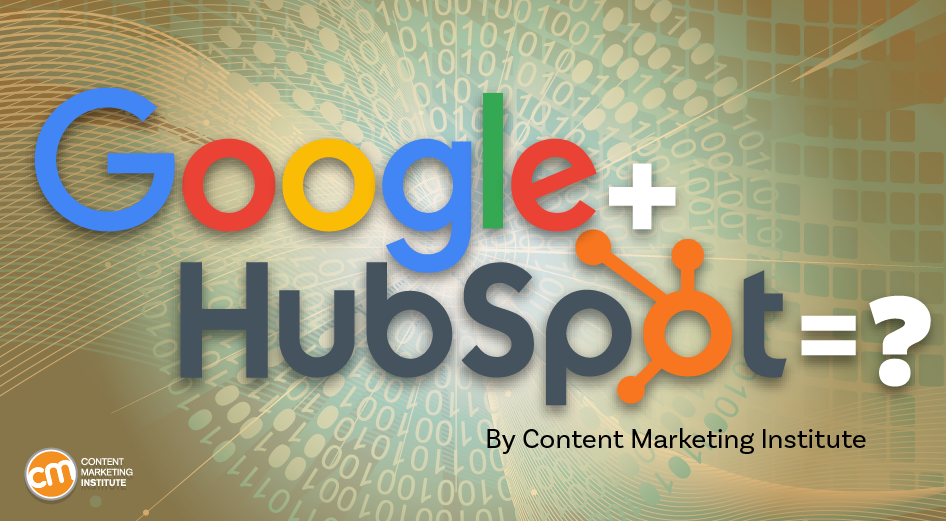
Google + HubSpot. Is it a thing?
This week, a flurry of news came down about Google’s consideration of purchasing HubSpot.
The prospect dismayed some. It delighted others.
But is it likely? Is it even possible? What would it mean for marketers? What does the consideration even mean for marketers?
Well, we asked CMI’s chief strategy advisor, Robert Rose, for his take. Watch this video or read on:
Why Alphabet may want HubSpot
Alphabet, the parent company of Google, apparently is contemplating the acquisition of inbound marketing giant HubSpot.
The potential price could be in the range of $30 billion to $40 billion. That would make Alphabet’s largest acquisition by far. The current deal holding that title happened in 2011 when it acquired Motorola Mobility for more than $12 billion. It later sold it to Lenovo for less than $3 billion.
If the HubSpot deal happens, it would not be in character with what the classic evil villain has been doing for the past 20 years.
At first glance, you might think the deal would make no sense. Why would Google want to spend three times as much as it’s ever spent to get into the inbound marketing — the CRM and marketing automation business?
At a second glance, it makes a ton of sense.
I don’t know if you’ve noticed, but I and others at CMI spend a lot of time discussing privacy, owned media, and the deprecation of the third-party cookie. I just talked about it two weeks ago. It’s really happening.
All that oxygen being sucked out of the ad tech space presents a compelling case that Alphabet should diversify from third-party data and classic surveillance-based marketing.
Yes, this potential acquisition is about data. HubSpot would give Alphabet the keys to the kingdom of 205,000 business customers — and their customers’ data that almost certainly numbers in the tens of millions. Alphabet would also gain access to the content, marketing, and sales information those customers consumed.
Conversely, the deal would provide an immediate tip of the spear for HubSpot clients to create more targeted programs in the Alphabet ecosystem and upload their data to drive even more personalized experiences on their own properties and connect them to the Google Workspace infrastructure.
When you add in the idea of Gemini, you can start to see how Google might monetize its generative AI tool beyond figuring out how to use it on ads on search results pages.
What acquisition could mean for HubSpot customers
I may be stretching here but imagine this world. As a Hubspoogle customer, you can access an interface that prioritizes your owned media data (e.g., your website, your e-commerce catalog, blog) when Google’s Gemini answers a question).
Recent reports also say Google may put up a paywall around the new premium features of its artificial intelligence-powered Search Generative Experience. Imagine this as the new gating for marketing. In other words, users can subscribe to Google’s AI for free, but Hubspoogle customers can access that data and use it to create targeted offers.
The acquisition of HubSpot would immediately make Google Workspace a more robust competitor to Microsoft 365 Office for small- and medium-sized businesses as they would receive the ADDED capability of inbound marketing.
But in the world of rented land where Google is the landlord, the government will take notice of the acquisition. But — and it’s a big but, I cannot lie (yes, I just did that). The big but is whether this acquisition dance can happen without going afoul of regulatory issues.
Some analysts say it should be no problem. Others say, “Yeah, it wouldn’t go.” Either way, would anybody touch it in an election year? That’s a whole other story.
What marketers should realize
So, what’s my takeaway?
It’s a remote chance that Google will jump on this hard, but stranger things have happened. It would be an exciting disruption in the market.
The sure bet is this. The acquisition conversation — as if you needed more data points — says getting good at owned media to attract and build audiences and using that first-party data to provide better communication and collaboration with your customers are a must.
It’s just a matter of time until Google makes a move. They might just be testing the waters now, but they will move here. But no matter what they do, if you have your customer data house in order, you’ll be primed for success.
HANDPICKED RELATED CONTENT:
Cover image by Joseph Kalinowski/Content Marketing Institute
MARKETING
5 Psychological Tactics to Write Better Emails

Welcome to Creator Columns, where we bring expert HubSpot Creator voices to the Blogs that inspire and help you grow better.
I’ve tested 100s of psychological tactics on my email subscribers. In this blog, I reveal the five tactics that actually work.
You’ll learn about the email tactic that got one marketer a job at the White House.
You’ll learn how I doubled my 5 star reviews with one email, and why one strange email from Barack Obama broke all records for donations.
5 Psychological Tactics to Write Better Emails
Imagine writing an email that’s so effective it lands you a job at the White House.
Well, that’s what happened to Maya Shankar, a PhD cognitive neuroscientist. In 2014, the Department of Veterans Affairs asked her to help increase signups in their veteran benefit scheme.
Maya had a plan. She was well aware of a cognitive bias that affects us all—the endowment effect. This bias suggests that people value items higher if they own them. So, she changed the subject line in the Veterans’ enrollment email.
Previously it read:
- Veterans, you’re eligible for the benefit program. Sign up today.
She tweaked one word, changing it to:
- Veterans, you’ve earned the benefits program. Sign up today.
This tiny tweak had a big impact. The amount of veterans enrolling in the program went up by 9%. And Maya landed a job working at the White House
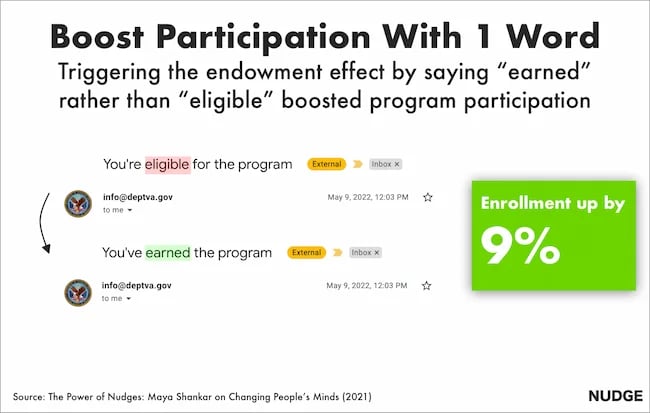
Inspired by these psychological tweaks to emails, I started to run my own tests.
Alongside my podcast Nudge, I’ve run 100s of email tests on my 1,000s of newsletter subscribers.
Here are the five best tactics I’ve uncovered.
1. Show readers what they’re missing.
Nobel prize winning behavioral scientists Daniel Kahneman and Amos Tversky uncovered a principle called loss aversion.
Loss aversion means that losses feel more painful than equivalent gains. In real-world terms, losing $10 feels worse than how gaining $10 feels good. And I wondered if this simple nudge could help increase the number of my podcast listeners.
For my test, I tweaked the subject line of the email announcing an episode. The control read:
“Listen to this one”
In the loss aversion variant it read:
“Don’t miss this one”
It is very subtle loss aversion. Rather than asking someone to listen, I’m saying they shouldn’t miss out. And it worked. It increased the open rate by 13.3% and the click rate by 12.5%. Plus, it was a small change that cost me nothing at all.
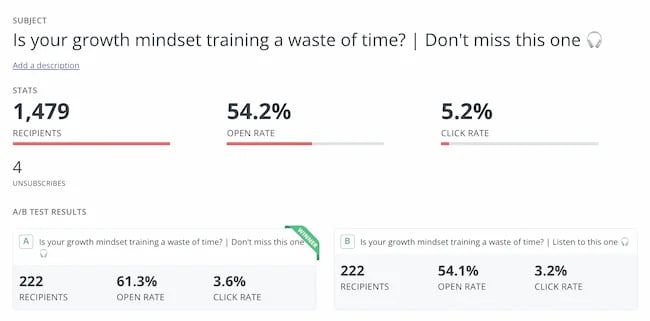
2. People follow the crowd.
In general, humans like to follow the masses. When picking a dish, we’ll often opt for the most popular. When choosing a movie to watch, we tend to pick the box office hit. It’s a well-known psychological bias called social proof.
I’ve always wondered if it works for emails. So, I set up an A/B experiment with two subject lines. Both promoted my show, but one contained social proof.
The control read: New Nudge: Why Brands Should Flaunt Their Flaws
The social proof variant read: New Nudge: Why Brands Should Flaunt Their Flaws (100,000 Downloads)
I hoped that by highlighting the episode’s high number of downloads, I’d encourage more people to listen. Fortunately, it worked.
The open rate went from 22% to 28% for the social proof version, and the click rate, (the number of people actually listening to the episode), doubled.
3. Praise loyal subscribers.
The consistency principle suggests that people are likely to stick to behaviours they’ve previously taken. A retired taxi driver won’t swap his car for a bike. A hairdresser won’t change to a cheap shampoo. We like to stay consistent with our past behaviors.
I decided to test this in an email.
For my test, I attempted to encourage my subscribers to leave a review for my podcast. I sent emails to 400 subscribers who had been following the show for a year.
The control read: “Could you leave a review for Nudge?”
The consistency variant read: “You’ve been following Nudge for 12 months, could you leave a review?”
My hypothesis was simple. If I remind people that they’ve consistently supported the show they’ll be more likely to leave a review.
It worked.
The open rate on the consistency version of the email was 7% higher.
But more importantly, the click rate, (the number of people who actually left a review), was almost 2x higher for the consistency version. Merely telling people they’d been a fan for a while doubled my reviews.
4. Showcase scarcity.
We prefer scarce resources. Taylor Swift gigs sell out in seconds not just because she’s popular, but because her tickets are hard to come by.
Swifties aren’t the first to experience this. Back in 1975, three researchers proved how powerful scarcity is. For the study, the researchers occupied a cafe. On alternating weeks they’d make one small change in the cafe.
On some weeks they’d ensure the cookie jar was full.
On other weeks they’d ensure the cookie jar only contained two cookies (never more or less).
In other words, sometimes the cookies looked abundantly available. Sometimes they looked like they were almost out.
This changed behaviour. Customers who saw the two cookie jar bought 43% more cookies than those who saw the full jar.
It sounds too good to be true, so I tested it for myself.
I sent an email to 260 subscribers offering free access to my Science of Marketing course for one day only.
In the control, the subject line read: “Free access to the Science of Marketing course”
For the scarcity variant it read: “Only Today: Get free access to the Science of Marketing Course | Only one enrol per person.”
130 people received the first email, 130 received the second. And the result was almost as good as the cookie finding. The scarcity version had a 15.1% higher open rate.

5. Spark curiosity.
All of the email tips I’ve shared have only been tested on my relatively small audience. So, I thought I’d end with a tip that was tested on the masses.
Back in 2012, Barack Obama and his campaign team sent hundreds of emails to raise funds for his campaign.
Of the $690 million he raised, most came from direct email appeals. But there was one email, according to ABC news, that was far more effective than the rest. And it was an odd one.
The email that drew in the most cash, had a strange subject line. It simply said “Hey.”
The actual email asked the reader to donate, sharing all the expected reasons, but the subject line was different.
It sparked curiosity, it got people wondering, is Obama saying Hey just to me?
Readers were curious and couldn’t help but open the email. According to ABC it was “the most effective pitch of all.”
Because more people opened, it raised more money than any other email. The bias Obama used here is the curiosity gap. We’re more likely to act on something when our curiosity is piqued.

Loss aversion, social proof, consistency, scarcity and curiosity—all these nudges have helped me improve my emails. And I reckon they’ll work for you.
It’s not guaranteed of course. Many might fail. But running some simple a/b tests for your emails is cost free, so why not try it out?
This blog is part of Phill Agnew’s Marketing Cheat Sheet series where he reveals the scientifically proven tips to help you improve your marketing. To learn more, listen to his podcast Nudge, a proud member of the Hubspot Podcast Network.
-

 WORDPRESS7 days ago
WORDPRESS7 days agoTurkish startup ikas attracts $20M for its e-commerce platform designed for small businesses
-

 MARKETING6 days ago
MARKETING6 days agoRoundel Media Studio: What to Expect From Target’s New Self-Service Platform
-

 SEO5 days ago
SEO5 days agoGoogle Limits News Links In California Over Proposed ‘Link Tax’ Law
-
SEARCHENGINES6 days ago
Daily Search Forum Recap: April 12, 2024
-

 SEARCHENGINES7 days ago
SEARCHENGINES7 days agoGoogle Search Results Can Be Harmful & Dangerous In Some Cases
-

 MARKETING7 days ago
MARKETING7 days agoUnlocking the Power of AI Transcription for Enhanced Content Marketing Strategies
-

 SEO5 days ago
SEO5 days ago10 Paid Search & PPC Planning Best Practices
-

 SEARCHENGINES5 days ago
SEARCHENGINES5 days agoGoogle Core Update Volatility, Helpful Content Update Gone, Dangerous Google Search Results & Google Ads Confusion









![5 Psychological Tactics to Write Better Emails → Download Now: The Beginner's Guide to Email Marketing [Free Ebook]](https://articles.entireweb.com/wp-content/uploads/2023/02/11-Free-Email-Hacks-to-Step-Up-Your-Productivity.png)
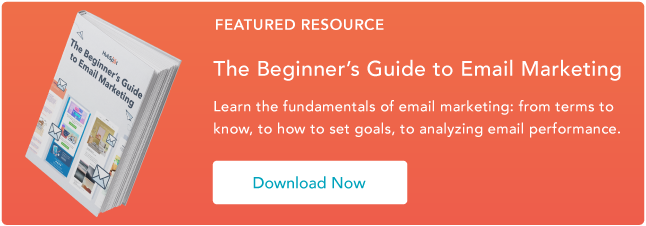


You must be logged in to post a comment Login